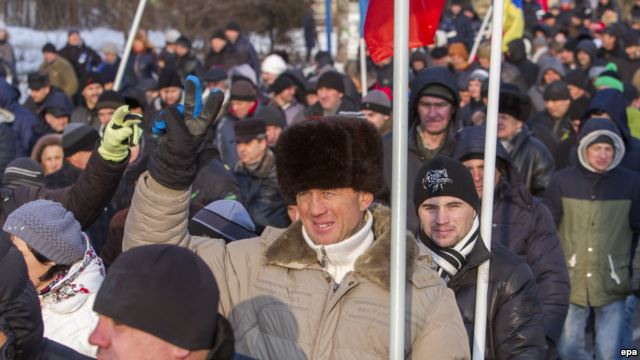
Russia Watches and Puts Own Spin on Moldova’s Crisis (Part Two)
Publication: Eurasia Daily Monitor Volume: 13 Issue: 25
By:

*To read Part One, please click here.
Western officials and commentators seem, on the whole, to overestimate Russia’s capacity and intentions to recapture Moldova by exploiting that country‘s current crisis. This overestimation partly explains the recent decisions in Washington, Brussels and Bucharest to accept billionaire Vladimir Plahotniuc’s full seizure of power, as preferable to a putative Russian takeover of Moldova in some form or another (see Part One, EDM, February 4).
That nervousness looked like a carryover from the real emergency in the spring of 2014, when Russia’s “Novorossiya” (“New Russia”) project in Ukraine’s southeast, with a focus on Odesa, could have threatened Moldova. Since then, however, Moldova seems hardly visible among Russia’s foreign policy priorities, interests, objectives or targets.
Moscow has only displayed scant, sporadic and unfocused attention to Moldova during the ongoing crisis there. Russia’s Security Council discussed Moldova as one of the items at one session chaired by President Vladimir Putin; and Kremlin spokesman Dmitry Peskov called on “all sides to observe the law, stay calm, and all political forces that support this part or that part of the opposition (i.e., pro-Europe and pro-Russia) to refrain from any violent actions“ (Interfax, January 21, 22).
No further statements on Moldova were monitored from high-level Russian officials. On the parliamentary side, according to the Duma’s Commonwealth of Independent States (CIS) Affairs Committee chairman Leonid Slutsky, the popular protests following the Western endorsement of Plahotniuc show the failure of the European Union’s Eastern Partnership in its once-exemplary country. If pre-term elections are held in Moldova now, the “pro-Eurasia” side would win, Slutsky predicted (Interfax, January 29). This assessment is widely shared in Moldova and the West. Still, Russia‘s officialdom is not calling for pre-term elections in Moldova.
The Kremlin’s television channels have not tried to inflame the situation in Moldova (in contrast to their past practice in Moldova and current practice elsewhere). They have not encouraged demands for pre-term elections either. Their news reporting (an instrument to influence the situation on the scene of events), as seen in Moldova, has been brief and restrained. For its part, Moldova prophylactically denied entry to five reporters from three different Russian television channels.
Even at the height of protests in Chisinau, the Kremlin’s main television channels carried only two reportages from the scene, eight days apart from each other (Russian TV Channel One, January 24; Rossiya TV, February 1). They depicted the United States and the European Union as siding with Plahotniuc’s corrupt regime, against the protesting people of Moldova. The protests had “unified political forces with opposite geopolitical vectors” against the new government of Pavel Filip, “Plahotniuc’s subordinate [stavlennik].” The EU’s Association Agreement—according to commentary and vox pops (man-on-the-street interviews) on screen—did not alleviate Moldova’s poverty, driving it instead to the current “revolution of despair” (see EDM, January 11, 12, 14, 15, 21, 28, 29).
While that slant sought as usual to alienate Moldova’s populace from the West, an entirely new slant emerged: ostracizing Plahotniuc. The Kremlin’s propaganda studiously ignored him years on end, for better or worse, until now. But those two reportages (see above) assaulted Plahotniuc by quoting local views of him as an “odious figure,” “blackmailer,” “the puppet master of corruption,” the emblematic “oligarch” who provoked this “anti-oligarchic movement” in Moldova (Russian TV Channel One, January 24; Rossiya TV, February 1). And a dedicated editorial feature by Dmitry Kiselev caricatured Plahotniuc into a pro-Western, pro-Romanian figure, a supporter of Moldova joining Euro-Atlantic organizations (Russian TV Channel One, January 31).
This sudden televised assault is almost certainly Moscow’s response to what it must view as Plahotniuc’s understandings with the US (blaming Victoria Nuland specifically), with the EU and with Romania. The message to all in Moldova is that Plahotniuc has become a pariah to Russia (at least until further notice). Plahotniuc will not receive an invitation to the Kremlin, which he had so coveted, any more than he would receive invitations to Western capitals. Plahotniuc is internationally isolated, his pocket government fully dependent on donors and lenders: Romania in the near term, the West beyond that.
But Moscow’s televised assault on Plahotniuc is also an expression of sour grapes. With or without Plahotniuc, with or without pro-Russia parties winning pre-term elections, Russia is in no position to assume responsibility for Moldova economically. The Kremlin has even slashed its support for Transnistria (see EDM, December 14, 2015). It is clearly beyond Russia’s means to sustain a Moldova hypothetically reoriented toward Russia. An under-resourced Kremlin is overcommitted on other fronts (see EDM, June 29, 2015). For all those considerations the Kremlin does not support regime change in Moldova at present or in the near future at least. This is also why Moscow‘s propaganda does not support the pro-Russia opposition’s calls for pre-term elections in Moldova. With Plahotniuc so vulnerable externally, there would be no excuse for failing to pressure him into ceding the key levers of power to pro-reform and pro-Western figures in Moldova.




